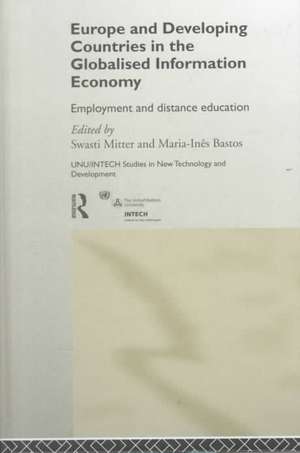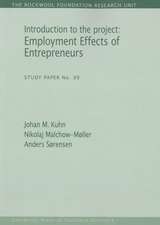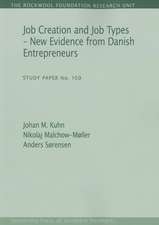Europe and Developing Countries in the Globalized Information Economy: Employment and Distance Education: UNU/INTECH Studies in New Technology and Development
Editat de Maria Ines Bastos, Swasti Mitteren Limba Engleză Hardback – 10 iun 1999
Preț: 364.63 lei
Preț vechi: 455.79 lei
-20% Nou
Puncte Express: 547
Preț estimativ în valută:
69.77€ • 72.100$ • 57.96£
69.77€ • 72.100$ • 57.96£
Carte tipărită la comandă
Livrare economică 02-16 aprilie
Preluare comenzi: 021 569.72.76
Specificații
ISBN-13: 9780415197045
ISBN-10: 041519704X
Pagini: 272
Ilustrații: 35 tables
Dimensiuni: 152 x 229 x 25 mm
Greutate: 0.52 kg
Ediția:New.
Editura: Taylor & Francis
Colecția Routledge
Seria UNU/INTECH Studies in New Technology and Development
Locul publicării:Oxford, United Kingdom
ISBN-10: 041519704X
Pagini: 272
Ilustrații: 35 tables
Dimensiuni: 152 x 229 x 25 mm
Greutate: 0.52 kg
Ediția:New.
Editura: Taylor & Francis
Colecția Routledge
Seria UNU/INTECH Studies in New Technology and Development
Locul publicării:Oxford, United Kingdom
Public țintă
PostgraduateCuprins
Introduction Part I: Information Revolution and New Modes of Employment and Work Organisation Chapter 1. Relocation of information processing work: Implications for trade between Asia and the European Union Swasti Mitter and Umit Efendioglu, UNU/INTECH, The NetherlandsChapter 2. Beyond anecdotes: On qualifying the globalisation of information processing work Ursula Huws, Analytica, London, UKA non-European counterpointTrade in Software services: From international trade to teletrade. The case study of Tata Consultancy services in India. N.P. Basrur, Tata Consultancy Services, Bombay, India and Seema Chawla, UNU/INTECH, The NetherlandsChapter 3. Externalising information processing work: Breaking the logic of spatial and work organisation Geraldine Reardon, Trade Union Researcher, London, UKChapter 4. Call centres and the prospects for export-oriented work in the developing world: Evidence from western Europe Ranald Richardson, University of Newcastle, UKA non-European counterpointThe globalised information society and its impact on Europe-Maghreb relations Abdelkader Djeflat, Universite des Sciences et Technologies de Lille, FranceChapter 5. Innovation and competitiveness in complex product systems: The case of mobile phone systems Andrew Davies, University of Sussex, UKA non-European counterpointThe South Africa mobile phone system Dave Kaplan, University of Cape Town, South AfricaPart II: Learning with telematics in the globalised information societyChapter 6. Europe and developing countries in the emerging on-line education market Maria Ines BastosChapter 7. Lifelong learning policies in a new technological era Albert Tuijnman, Institute of International Education, Stockholm, SwedenA non-European counterpointProductive two-way collaboration between technologically developed and developing countries in new technologies for education Peter E. Kinyanjui, The Commonwelath of Learning, CanadaChapter 8. Testing tecnology for tele-education: Pilot projects at KPN in the Netherlands Eline de Kleine, KPN Research, The NetherlandsA non-European counterpointThe Brazilian 'TELECURSO 2000'. An experience with applications of communications technologies to vocational and continuous education Arlette A. Paula Guibert, National Service of Industrial Apprenticeship, Regional Department of Sao Paolo, BrazilChapter 9. Technologies for distance education in developing countries Wolfram Laaser, Fern Universitaet Hagen, GermanyChapter 10. KIDLINK - Global network for youth Claus Berg, Ministry of Education, DenmarkA non-European counterpointDistance education in Latin America at the technology cross- roads Fabio Jose Chacon Duque, Open National University, VenezuelaConclusions
Notă biografică
Bastos, Maria Ines ; Mitter, Swasti
Descriere
This volume explores the challenges and the opportunities created by the rapid growth of 'telematics'. The authors explore the differing responses of Europe and of the developing world.




















